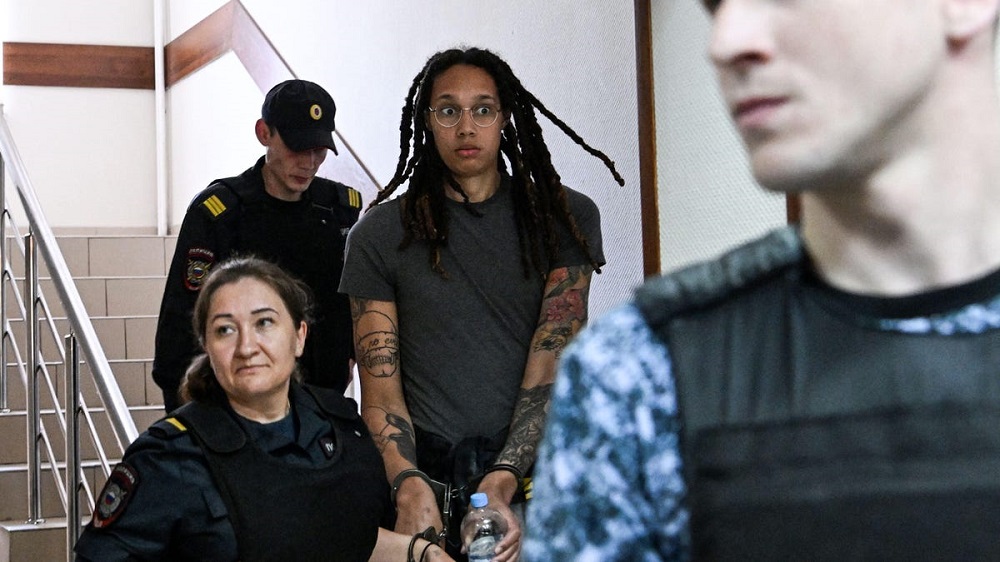
OPINION: This article contains commentary which may reflect the author’s opinion
Raw cannabis cannot be used in Russia, including for medical purposes. Among the narcotics and psychoactive substances, cannabis is on Russia’s “List I.” There is strict government control over the circulation of substances on List I.
According to the Russian Criminal Code, narcotic and psychotropic substances, their analogs, and plants containing them (including cannabis) are prohibited if manufactured, sold, or delivered without authorization.
Article 228.1 of the Russian Criminal Code provides for punishment for violating special rules for the circulation of narcotics and psychotropic substances. In the worst-case scenario (if such a violation results in injury), a person can be imprisoned for up to three years.
Russian officials are upset that the United States says WNBA star Brittney Griner was “wrongfully detained” for having marijuana.
According to Fox News, Maria Zakharova, a spokeswoman for the Russian Foreign Ministry said legalizing marijuana in some parts of the United States has no bearing on Russian law.
“If a U.S. citizen was taken in connection with the fact that she was smuggling drugs, and she does not deny this, then this should be commensurate with our Russian, local laws, and not with those adopted in San Francisco, New York, and Washington,” she said.
“You understand if drugs are legalized in the United States, in a number of states, and this is done for a long time, and now the whole country will become drug-addicted, this does not mean that all other countries are following the same path,” she added.
Russian media has posited that Griner could be exchanged for Viktor Bout, a Russian arms dealer and known terrorist. But the DEA agent who helped arrest Bout warned against trading for him.
Zachariasiewicz wrote an op-ed for USA Today in which he warned against trading Viktor Bout, a dangerous individual he helped capture, for Griner and/or Paul Whelan, two innocent, wrongfully detained individuals.
“Bout, who is known as the “Merchant of Death,” provided the fuel for conflicts across the globe. He was a critical player in the global illicit arms trade not because he could obtain weapons but because he could deliver his destructive cargo anywhere in the world through his control of a private fleet of military aircraft. And he did just that,” Zachariasiewicz said.
“A tremendous amount of resources and political capital were spent on the critical national security investigation into Bout’s actions. Lives were placed at risk, and tireless efforts were made. Now many voices are not being adequately considered in these deliberations over whether to free Bout in exchange for an American. Those voices include an entire generation of maimed and orphaned inhabitants of war-torn countries throughout the world, especially in Africa,” he argued.
According to him, President Joe Biden and others believe such a deal is “appropriate” and are considering it, but supporters of the deal do not consider the danger involved.
According to him, Bout has served less than 15 years of his 25-year sentence, or under 60 percent, and that the evidence against him is “extensive and damning.”
“In a recorded undercover meeting, he declared to persons he believed to be terrorist facilitators that the United States was his sworn enemy. He offered them, as part of an extensive arsenal of heavy weapons, hundreds of surface-to-air missiles to be used against U.S. military advisers and the Colombian military,” Zachariasiewicz said.
“Bout’s potential re-engagement in the arms trade is not the primary national security implication to be considered. Rather, it is the negative and resounding message that such a capitulation would send.
“Negotiating for Bout’s release is a feckless and shortsighted foreign policy. Such actions merely encourage our adversaries to engage in the kidnapping, illegal detention, and ransoming of American citizens throughout the world. Organizations such as Hezbollah, drug cartels, and the Russian Federal Security Service are emboldened when their criminal actions are rewarded. We must make abundantly clear that there is nothing to be gained by engaging in these criminal actions,” he continued.
According to him, it would be a betrayal of those who risked their lives in arresting Bout to use him as a trade chip to get back non-threatening prisoners.
As well, he blamed Griner, Whelan, and others for making bad choices that put them in the position they’re in.
“We also must find ways to discourage our citizens from needlessly placing themselves in harm’s way – whether missionaries looking to spread goodwill, adventure seekers chasing a unique experience or the vulnerable succumbing to criminal scams. I speak from experience, as I dedicated nearly three years to seeking the successful release of an innocent American citizen jailed overseas,” he said.
“Griner, Whelan, and Trevor Reed each decided to travel to Russia for profit and/or personal pleasure. Russia has been a hostile state since long before the invasion of Ukraine. That said, I have nothing but prayers and well wishes for each of them and their families. We should not abandon our citizens in their time of need and should make tireless efforts to get them safely home to their loved ones – but these efforts should not be centered around an ill-advised trade,” he added.
It is a matter of debate whether Griner is innocent since she did break Russian law when she committed the crime.
“The deliberations at hand appear aimed at garnering votes and rehabilitating a badly failing agenda,” he concluded.
Source: The Republic Brief